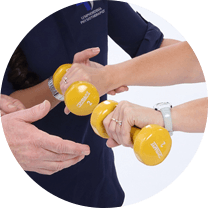 If you have been recently diagnosed with cancer or are undergoing treatment, it's important to take special care of yourself.
If you have been recently diagnosed with cancer or are undergoing treatment, it's important to take special care of yourself.
Studies show that one of the best ways to do this is to stay physically active by including exercise into your daily routine.That doesn't mean you should train to run a marathon, but that it is of great benefit to add some form of regular exercise -- even during cancer treatment. Moderate aerobic exercise, such as riding a stationary bicycle or taking a daily walk, coupled with the use of light weights for strength training, can enhance physical well-being and enhance recovery.
The Oedema Clinics cancer exercise program is uniquely designed for individuals undergoing or recovering from cancer treatment. The program includes active rehabilitation exercises to ensure effective movement, recovery of functional deficits and improve wellbeing.
Oedema Clinics physiotherapist run the exercise classes and cater to all levels of activity, from those who need to exercise in a chair to those who feel well and are progressing to increase fitness.
Appropriate exercise under professional supervision - before, during, or after treatment - seems to substantially improve your odds at surviving cancer and being well thoughout the treatment. Findings of the Exercise Medicine Research Institute, Perth, WA.
Research has found no harmful effects on patients with cancer from moderate exercise and, in fact, has demonstrated that those who exercised regularly had 40% to 50% less fatigue, the primary complaint during treatment.
Engaging in regular exercise increases muscle strength, joint flexibility and general conditioning, all of which may be impaired by surgery, radiation and chemotherapy onclogy. Exercise is known to improve cardiovascular function and to protect bones. It also elevates mood, offering drug-free relief for the feelings of depression that may accompany a cancer diagnosis and treatment regime.
Finally, exercise helps control weight -- a crucial factor, as studies have shown that gaining weight during and after treatment raises the risk of a cancer recurrence, particularly for breast, colon and prostate cancers.
It is important to be assessed by your physiotherapist as to the type of exercise you can perform to ensure it will be safe.
Oedema Clinics physiotherapists will guide you through the appropriate starting point and progress you through to higher level activities incrementally. Depending on fitness and comfort level, some people may need to start a class seated; others may find they can exercise for the full 60 minutes right away. A mix either way is catered for in our new dedicated exercise room.
Your progress and goals will be reviewed with our physiotherapists to include your individualised program that you can perform at home. Our aim is be cautious, yet effective, to ensure you don't become discouraged and stop exercising altogether. For regular gym goers, before cancer, our physiotherapist may be assisting you to lower the intensity of workouts for a while, ensuring a health progression through your treatment.
Here are some suggestions for class attendance:
 Comprehensive Tailored Packages
Comprehensive Tailored PackagesTake the stress out of organising your own rehabilitation plan. We offer structured and innovative programs, from 1:1 sessions, through to full intensive group services.